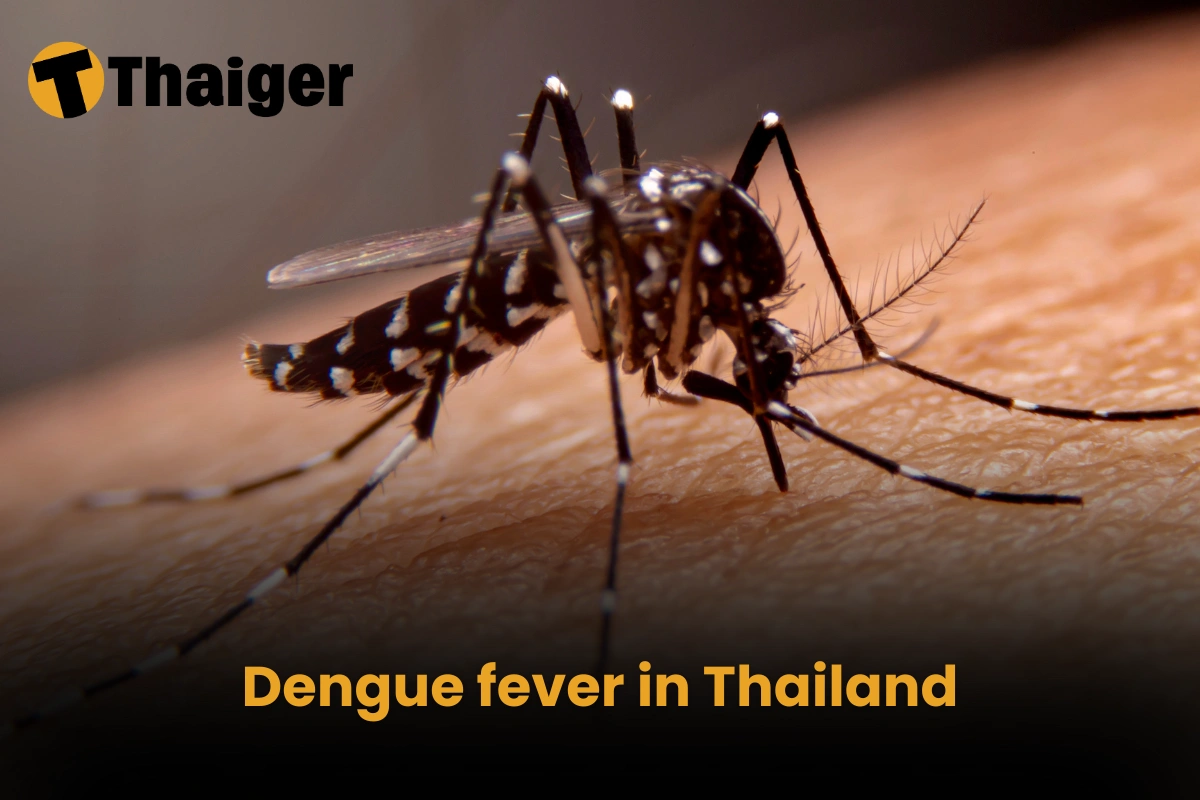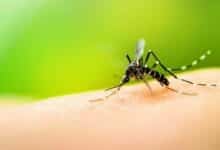Dengue fever in Thailand


Dengue fever is a viral infection caused by four types of dengue virus (DENV-1, DENV-2, DENV-3, and DENV-4). It is transmitted to humans through the bite of infected Aedes mosquitoes, primarily Aedes aegypti. These mosquitoes thrive in tropical and subtropical regions, making countries like Thailand particularly vulnerable to outbreaks.
Globally, dengue fever is a growing health concern, with an estimated 100–400 million infections occurring each year. Thailand experiences a high prevalence of dengue due to favourable climate conditions, urbanization, and the presence of all four virus serotypes, which allow the virus to spread more easily.
Dengue cases in Thailand

Dengue fever is a serious health problem in Thailand, with the number of cases increasing every year. In 2023, there were 136,655 reported cases, which is a huge jump compared to 46,755 in 2022 and 10,617 in 2021. This sharp rise highlights the nature of dengue outbreaks, which often peak every two to three years. These outbreaks are closely linked to changes in weather patterns, especially during the rainy season, when conditions favour mosquito breeding. Dengue fever has become a regular health concern, affecting both locals and travellers in the country.
High-risk seasons in Thailand
The rainy season in Thailand, which lasts from May to October, is the most dangerous time for dengue fever. Heavy rainfall leaves behind stagnant water in drains, containers, and other places, creating perfect breeding grounds for Aedes mosquitoes that carry the virus.
Most dengue cases occur during or shortly after the rainy season because the mosquito population increases significantly. Public health authorities often ramp up efforts to control mosquitoes and educate people during this time, but the risk remains high.
Regional hotspots of Dengue fever
Dengue fever is more common in certain areas of Thailand. High-risk regions include Bangkok, Trat, Nan, Chanthaburi, Rayong, and Mae Hong Son, where high mosquito populations and urban environments contribute to outbreaks. Other provinces, such as Nong Bua Lamphu, Pathum Thani, and Narathiwat, also report many cases due to poor waste management and rapid urbanization, which create more places for mosquitoes to breed. People living in or visiting these areas should take extra precautions, such as wearing protective clothing and using mosquito repellents.
By understanding when and where dengue fever is most likely to spread, individuals and communities can take better steps to prevent infections. Simple actions like removing stagnant water, using mosquito nets, and staying informed can help reduce the risk of dengue fever and its serious health impacts.
- Chachoengsao family seeks answers after dengue kills girl, 6Tuesday, July 22, 2025
- Thailand goes to war on dengue with free vaccine planTuesday, June 10, 2025
Prevention tips for Dengue fever in Thailand

Preventing dengue fever requires protecting yourself from mosquito bites and supporting community efforts to reduce mosquito populations. Here are some simple but effective tips.
How to avoid mosquito bites while staying in Thailand
- Use insect repellents: Apply insect repellents with ingredients like DEET, picaridin, or oil of lemon eucalyptus. These repellents keep mosquitoes away and should be reapplied as directed, especially when outdoors or in high-risk areas.
- Wear protective clothing: Choose long-sleeved shirts and long pants, preferably loose-fitting and light-coloured. Light colours attract fewer mosquitoes, and long clothing helps protect your skin from bites.
- Stay in mosquito-safe places: When possible, stay in air-conditioned rooms or places with screened windows and doors. This helps keep mosquitoes out, especially during peak activity times in the early morning and late afternoon.
- Eliminate standing water: Mosquitoes lay their eggs in stagnant water, so it’s important to remove any sources of standing water around your home. Empty containers, clean out gutters, and check flowerpots to prevent water from collecting.
Community and government efforts to reduce Dengue cases
- Fumigation campaigns: The Thai government conducts regular fumigation in high-risk areas to kill mosquitoes and reduce their numbers. These campaigns often happen during the rainy season when dengue cases are high.
- Community clean-up drives: Programs like “Big Cleaning Day” encourage people to work together to clean their neighbourhoods. Residents remove trash, clean drains, and get rid of items that collect water, which helps reduce mosquito breeding grounds.
- Public health volunteers: Local public health volunteers play a vital role by visiting homes to educate people about preventing dengue. They also help identify and remove places where mosquitoes can breed, making neighbourhoods safer.
- Awareness campaigns: Public health authorities run campaigns to teach people about dengue risks and prevention. These include posters, workshops, and leaflets that show how to avoid bites and what to do if someone has dengue.
By taking personal precautions and participating in community initiatives, everyone can help reduce the risk of dengue fever in Thailand. Simple actions like wearing repellent, removing stagnant water, and supporting local mosquito control efforts can make a big difference.
Dengue fever treatment options in Thailand

If you suspect you have dengue fever while in Thailand, it is important to act quickly. Dengue can become serious if left untreated, so knowing the right steps to take and where to seek help is crucial.
Immediate steps to take if you suspect Dengue Fever
- Seek medical care immediately: Visit a doctor or hospital as soon as possible, especially if you have severe symptoms like persistent vomiting, bleeding gums, or intense abdominal pain. Early diagnosis and treatment can prevent complications.
- Stay hydrated: Drink plenty of fluids such as water, coconut water, or oral rehydration solutions to avoid dehydration. Dehydration is common with dengue and can worsen the symptoms.
- Avoid certain medications: Do not take NSAIDs like aspirin or ibuprofen, as these can increase the risk of bleeding. Paracetamol (acetaminophen) is the safest option for reducing fever and relieving pain.
Medical facilities and healthcare access in Thailand
Thailand has a strong healthcare system, especially in cities and tourist areas. Major hospitals are experienced in treating dengue fever and offer services in both Thai and English, making them accessible for locals and tourists alike.
- Hospitals in cities and tourist areas: Thailand’s major cities and tourist areas have well-equipped hospitals that are skilled in treating dengue. For example, Bangkok Hospital Pattaya provides PCR tests to detect dengue early, with results available within 24 hours. This helps with quick diagnosis and treatment.
- Public hospitals: Public hospitals also offer quality care but may have longer waiting times. These facilities are widely available, even in smaller towns.
- Emergency care: For severe cases, hospitals provide intensive care, including blood transfusions and continuous monitoring to manage complications such as severe bleeding or organ damage.
General advice for managing Dengue fever
- Monitor symptoms closely: The critical phase of dengue usually occurs 3 to 7 days after the fever starts. Watch for warning signs like rapid breathing, severe abdominal pain, or blood in vomit or stool, and seek immediate medical help if they appear.
- Get plenty of rest: Allow your body time to recover. Avoid overexertion and focus on resting while following your doctor’s advice.
- Hydration is key: Keep drinking fluids to replace what your body loses due to fever and sweating. In severe cases, doctors may provide intravenous fluids to prevent dehydration.
- Remain alert: Even after recovery, it is important to follow up with your doctor if symptoms persist or worsen.
Symptoms of Dengue fever

Dengue fever symptoms typically appear 3 to 15 days after being bitten by an infected Aedes mosquito, with most cases showing signs within 5 to 8 days. Common symptoms include:
- High fever: Often spiking up to 40°C (104°F).
- Severe headache: Particularly intense pain behind the eyes.
- Muscle and joint pain: Known as “breakbone fever” due to its intensity.
- Skin rash: Usually starts on the torso and may spread further.
- Nausea and vomiting: Gastrointestinal discomfort that can affect overall health.
- Fatigue and loss of appetite: Often accompanied by general weakness.
Severe Dengue and warning signs
In some cases, dengue can progress to severe dengue, which is life-threatening without timely treatment. Warning signs to watch for include:
- Persistent vomiting.
- Intense abdominal pain.
- Bleeding gums or nosebleeds.
- Blood in vomit or stool.
- Rapid breathing or difficulty breathing.
- Extreme fatigue and restlessness.
If these severe symptoms occur, seek immediate medical attention. Early detection and proper care are crucial in preventing complications and reducing the risk of fatal outcomes.
Why prompt action matters in curing Dengue fever
Dengue fever has no specific cure, but with the right care, most people recover fully. Thailand’s healthcare system is well-prepared to handle dengue cases, offering both symptomatic relief and advanced care for severe cases. By seeking medical attention early, staying hydrated, and carefully monitoring symptoms, you can reduce the risks and recover safely.
Dengue fever is a significant health concern in Thailand, but it can be effectively managed through prevention and early detection. Taking precautions like using insect repellents, wearing protective clothing, and avoiding stagnant water can greatly reduce the risk of infection. Staying informed about symptoms and seeking prompt medical care if needed are essential steps to ensure safety. With the right awareness and preparedness, visitors and residents can enjoy their time in Thailand while minimising health risks.
Latest Thailand News
Follow The Thaiger on Google News:


























